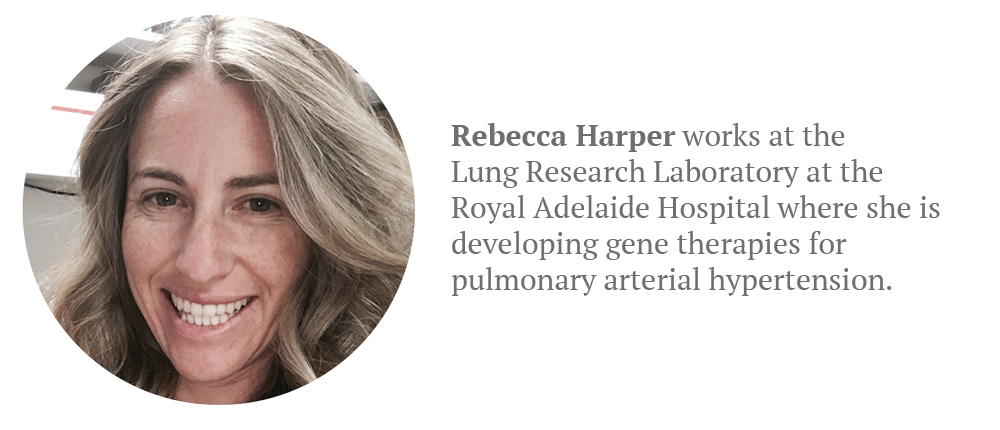
In this month’s holy grail we caught up with recipient of the 2015 TSANZ Ann Woolcock Young Investigator Award Rebecca Harper on her work with endothelial progenitor cells to find a better treatment, and potentially a cure, for patients living with pulmonary arterial hypertension. We also learnt that she’s run out of excuses to read the Harry Potter series.
What’s the issue your research is trying to solve?
Patients with pulmonary arterial hypertension (PAH) have an extremely poor prognosis (55% survival at 3 years) and available therapies have not changed this.
Additionally, patients with the disease have a severely limited quality of life, and this needs to change. The work I do is centred on finding a better treatment and hopefully a permanent treatment for people who have PAH and by working on a treatment for this disease, I hope that it can be applied for other vascular diseases, even cancer.
What have you discovered so far?
Recently I’ve developed a cell therapy that delivers a desired gene to the lung and I’ve been able to show it ameliorates PAH in an animal model. This is the very first step for this therapy approach and I hope it’s just one of many leading down the pathway to a clinical trial.
What’s been your biggest hurdle?
Research wise it has been very difficult to isolate, culture and characterise the cell type I use. Endothelial progenitor cells are quite rare and very fussy. What defines their phenotype is always changing in the research field and so it has been difficult to develop the culture environment to produce these cells and then prove they are what we think they are.
Personally, my biggest hurdle has been trying to put 100% into my research as well as balance the many demands in my personal life. I have a household with two kids that has to keep functioning and I also play and coach touch football at a national level- though, I wouldn’t have it any other way!
How far is your work from impacting patient care?
I would like to say not far, however the road from bench to bedside is a long and difficult one to navigate. I’m hoping that a recent collaboration will take the cell therapy one step closer to the clinic, but I’m looking at years down the road.
If you could discover one thing in your research, what would it be? (e.g what’s your holy grail?)
An effective cell therapy that is not just a cure for PAH, but cancers that have similarities to this disease, and in doing so, I would like to discover how these cell therapies are effective. There are so many clinical trials out there that use stem cells as a therapy, but we still don’t know exactly how or why they are so effective.
If you could take two things to a desert island what would they be?
My partner, Ninh and a touch footy (editors note: We’ve noticed you’ve left your kids behind!).
What are you reading at the moment?
Harry Potter- I promised my kids I would read the series when I handed in my thesis, I no longer have an excuse.